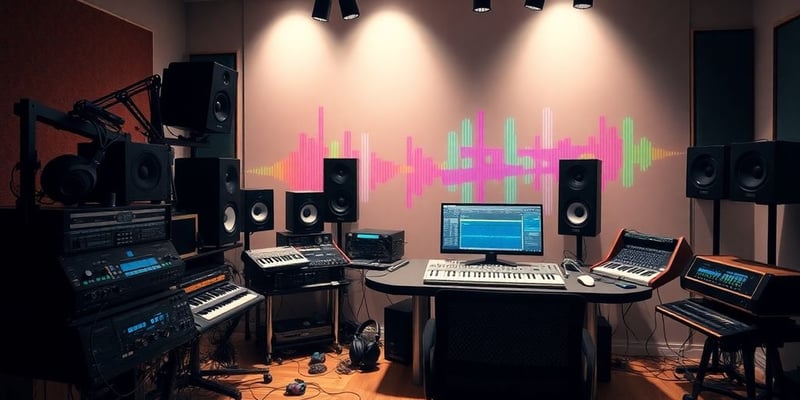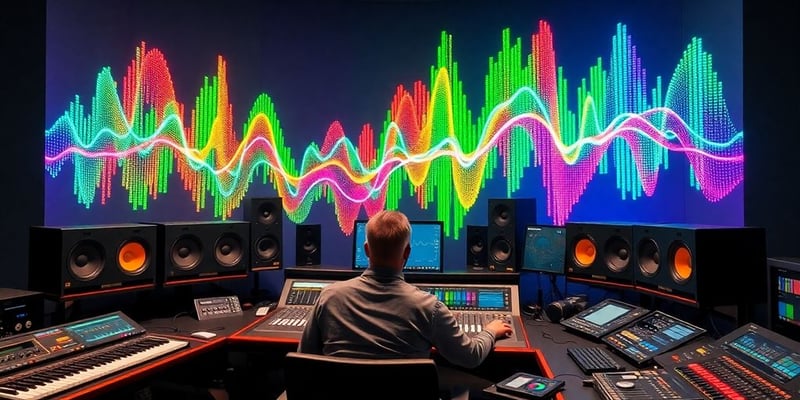
Unlocking Creativity: How AI Sound Effects are Transforming Audio Production
Save 15%

AI sound effects are shaking up the audio production world. From music to movies, and even podcasts, these digital tools are changing how we think about sound. They're not just a novelty—they're becoming a staple in the industry. As AI continues to evolve, it's opening up new ways to create and experience audio. This article explores how AI sound effects are transforming audio production today.
Key Takeaways
- AI sound effects are becoming essential in modern audio production, influencing music, film, and gaming.
- AI tools are helping musicians and producers by creating new sounds and improving workflow efficiency.
- AI is making sound design more accessible, allowing creators to experiment without needing expensive equipment.
- The rise of AI in audio is sparking discussions about ethics, creativity, and the future of sound production.
- Future trends suggest AI will continue to personalize and adapt audio experiences in real-time.
The Rise of AI Sound Effects in Modern Audio Production
Understanding AI-Driven Sound Design
AI-driven sound design is reshaping how audio is crafted, moving beyond just automation to becoming a creative partner in the studio. AI can now mimic complex soundscapes, blending them seamlessly into audio projects. This isn't just about making things faster; it's about opening up new avenues for creativity. With AI, sound designers can experiment with sounds that were previously hard to imagine, pushing the boundaries of what's possible in audio production.
Key Players in AI Audio Innovation
Several companies are leading the charge in AI audio innovation. Names like iZotope and AIVA are not just buzzwords but pioneers in this field. iZotope, for instance, has developed AI-powered tools that assist in mixing and mastering, ensuring that even those new to the field can produce professional-quality sound. Meanwhile, AIVA focuses on AI composition, allowing artists to generate music that complements human creativity. These tools are making it easier for anyone to delve into audio production without needing a full-fledged studio.
Impact on Traditional Sound Engineering
The integration of AI into sound engineering is causing a shift in traditional roles. Engineers who once spent hours fine-tuning audio levels now find themselves collaborating with AI systems to achieve their goals more efficiently. This doesn't mean that human expertise is being sidelined; rather, it's being augmented. AI tools are enhancing the capabilities of sound engineers, allowing them to focus more on the artistic aspects of their work. However, this shift also raises questions about the future of jobs in the industry, as AI continues to evolve and take on more responsibilities.
Revolutionizing Music Creation with AI Sound Effects
AI Tools for Composition and Arrangement
AI tools are reshaping how music is composed and arranged. These tools can analyze patterns and emotions to generate new sounds and genres. AI-driven music production tools are making waves by providing remarkable applications for composition, mixing, and mastering. Some notable AI composition tools include AIVA, Amadeus Code, and Muse Net by OpenAI. These tools learn from vast amounts of musical data, identifying patterns like chords and tracks to create unique compositions.
Enhancing Creativity with AI
AI is not just about automation; it's about collaboration. By using AI-generated tracks as a starting point, artists can add their own flair, blending machine precision with human artistry. This partnership allows musicians to explore new creative avenues, pushing the boundaries of what's possible in music production. AI can handle technical tasks like balancing levels and improving sound quality, freeing up producers to focus on the artistic side of things. AI is transforming music production by enhancing technical processes, allowing producers to focus more on creativity and innovation.
Case Studies of AI in Music Production
A great example of AI in action is Taryn Southern's album "I AM AI," where she used AI tools like Amper Music to create instrumental tracks. This project showed how AI can empower artists with limited traditional skills to produce professional-sounding music. Another example is David Cope's AI system, EMI, which composes pieces in the style of classical composers like Bach and Mozart. These case studies highlight the potential for AI to serve as a creative partner, inspiring new compositions and pushing the boundaries of musical creation.
AI in music production is not about replacing humans but complementing them. It's a tool that enhances creativity, streamlines workflows, and opens up new possibilities. The most successful producers will likely be those who can effectively collaborate with AI, leveraging its strengths while adding their unique human touch.
AI Sound Effects: A New Era for Film and Gaming

Transforming Soundscapes in Film
AI sound effects are shaking up the film industry by offering new ways to create immersive soundscapes. Directors and sound designers now have access to AI tools that can generate complex audio environments with minimal effort. These tools analyze scripts and scenes to suggest or create sound effects that fit perfectly with the visual elements. Imagine a sci-fi movie where the sound of a futuristic city is crafted by an AI, capturing every detail from the whirring of hover cars to the bustling crowds. This not only saves time but also expands creative possibilities.
AI in Game Audio Design
In gaming, sound is crucial for building atmosphere and enhancing player experience. AI sound tools can dynamically adapt audio based on player actions, creating a more interactive experience. For example, the sound of footsteps might change depending on the surface or the character's speed, all thanks to AI algorithms. Some AI systems even allow developers to input text prompts to generate specific sound effects, similar to how Nvidia's Fugatto lets users craft music and effects through simple commands.
Challenges and Opportunities in AI Audio
While AI sound technology offers exciting opportunities, it also comes with challenges. One major concern is the potential loss of jobs for traditional sound engineers. However, many in the industry see AI as a tool that can enhance rather than replace human creativity. There's also the challenge of ensuring AI-generated sounds maintain a human touch. Despite these hurdles, the potential for AI to innovate in audio production is immense, opening new avenues for creativity and efficiency.
The Role of AI Sound Effects in Podcasting and Broadcasting
Streamlining Audio Editing with AI
AI is shaking up the podcasting world by making audio editing smoother and faster. Gone are the days of spending hours fine-tuning audio clips. With AI, podcasters can automate tasks like noise reduction, sound leveling, and even identifying unwanted sounds. This means creators can focus more on content and less on technical hurdles. AI tools are also learning to adapt to different voices and styles, making them even more efficient.
Creating Immersive Sound Experiences
Podcasts and broadcasts are becoming more engaging thanks to AI-driven sound effects. These tools can craft immersive audio environments that pull listeners into the story. Imagine a podcast about the rainforest where you hear the rustling leaves and distant animal calls, all generated by AI. This technology allows creators to experiment with soundscapes, transforming ordinary audio into something extraordinary. AI can even tailor these experiences to individual listener preferences, enhancing personalization.
AI Tools for Podcast Production
There are several AI tools out there designed to help with podcast production. From voice synthesis to automatic transcription, these tools are making content creation more accessible. They can save time and reduce costs, which is a big plus for independent creators. Some popular AI tools in the podcasting sphere include Descript for editing and Otter.ai for transcription. These tools not only speed up the production process but also open up new creative possibilities.
AI-generated podcasts are changing the game, offering new ways to produce and consume audio content. This innovation is challenging traditional broadcasting and pushing the boundaries of what's possible in podcasting.
Ethical Considerations in the Use of AI Sound Effects
Balancing Human Creativity and AI
AI is changing the way we create sound, but it's important to remember that it should be a tool, not a replacement for human creativity. The magic of music and sound design often lies in the human touch, something AI can't replicate. People worry that AI could overshadow human talent, but many see it as a way to push creative boundaries. Here are some challenges:
- Collaborating effectively with AI
- Maintaining human creativity in sound production
- Addressing concerns about job displacement
Addressing Copyright and Ownership Issues
With AI generating music and sound effects, there are big questions about who owns what. Is it the person who created the AI, the user, or the AI itself? These questions are tricky, and the laws haven't caught up yet. Here are some key issues:
- Determining legal ownership of AI-generated content
- Protecting original creators' rights
- Navigating international copyright laws
The Future of AI in Audio Ethics
The future of AI in audio is exciting, but we need to be careful about how we use it. Transparency is key. Users should understand how AI tools work to avoid unintentional biases. A responsible approach will help ensure AI enhances, rather than detracts from, creative narratives.
As AI continues to evolve, the potential for its use in audio production will only grow. However, we must ensure that its integration is done ethically and responsibly, striking a balance between innovation and integrity.
For more on the ethical implications of AI in audio, check out this guide which emphasizes transparency and responsible usage in creative narratives.
Future Trends in AI Sound Effects and Audio Production

Personalized Audio Experiences
Imagine listening to a song that feels like it was made just for you. That's what personalized audio experiences aim to achieve. AI can analyze your listening habits, preferences, and even your mood to tailor music specifically for you. This isn't just about creating a playlist; it's about crafting an entire audio experience that resonates with individual tastes. The future of music could see AI curating not just songs, but the emotions and vibes they evoke.
- AI algorithms analyze user data to predict preferences.
- Tailored soundscapes for different activities like studying, relaxing, or working out.
- Potential for creating unique versions of songs for each listener.
Real-Time Sound Adaptation
Picture this: you're playing a video game, and the background music changes dynamically based on your actions or the game's environment. Real-time sound adaptation is set to revolutionize interactive media. AI can modify sound effects and music on-the-fly, creating a more immersive experience.
- Adaptive audio systems that respond to user interactions.
- Enhanced engagement in gaming and virtual reality environments.
- Customizable soundtracks that shift with narrative developments.
The Next Frontier in AI Audio Technology
AI audio technology is moving fast, and the next frontier is all about pushing boundaries. From creating hyper-realistic virtual soundscapes to developing AI-powered tools that assist in music production, the possibilities are endless. Generative AI is already making waves in music production, enabling rapid creation and enhancing the creative process.
- Development of AI tools that mimic human creativity and intuition.
- Integration of AI in both hardware and software for seamless audio production.
- Exploration of new genres and sounds through AI experimentation.
The future of audio production is not just about replacing traditional methods, but about enhancing them with AI's capabilities. As technology advances, the line between human and machine creativity continues to blur, opening up new avenues for artistic expression.
Conclusion
AI is shaking up the audio production world in ways we couldn't have imagined a few years ago. It's not just about making things faster or cheaper; it's about opening doors to creativity that were previously locked. Sure, there are concerns about AI taking over jobs or losing that human touch in music, but it's more about finding a balance. AI can be a powerful partner, helping artists and producers push boundaries and explore new sounds. As we look to the future, it's clear that those who embrace AI's potential while still holding onto their unique human flair will lead the charge in this exciting new era of music production.
Frequently Asked Questions
What are AI sound effects?
AI sound effects are audio elements created or enhanced using artificial intelligence technologies. They can be used in music, films, games, and other media to create unique and innovative soundscapes.
How do AI sound effects change music production?
AI sound effects help music producers by offering new tools for creating, mixing, and mastering music. These tools can generate new sounds, balance audio levels, and improve sound quality, making music production more efficient and creative.
Can AI replace human sound engineers?
While AI can assist with many technical aspects of sound engineering, it lacks the human touch and creativity that sound engineers bring. AI is best used as a tool to enhance human creativity, not replace it.
What are some examples of AI tools used in music?
Some AI tools used in music include AIVA, Amadeus Code, Muse Net by OpenAI, and iZotope’s Neutron and Ozone. These tools help with composition, mixing, and mastering tasks.
Are there any challenges with using AI in audio production?
Yes, there are challenges such as ethical concerns, copyright issues, and the potential loss of jobs for sound engineers. Balancing AI's capabilities with human creativity is key to overcoming these challenges.
What is the future of AI in audio production?
The future of AI in audio production includes personalized audio experiences, real-time sound adaptation, and more advanced AI tools that work alongside human creators to produce innovative music and sound.









